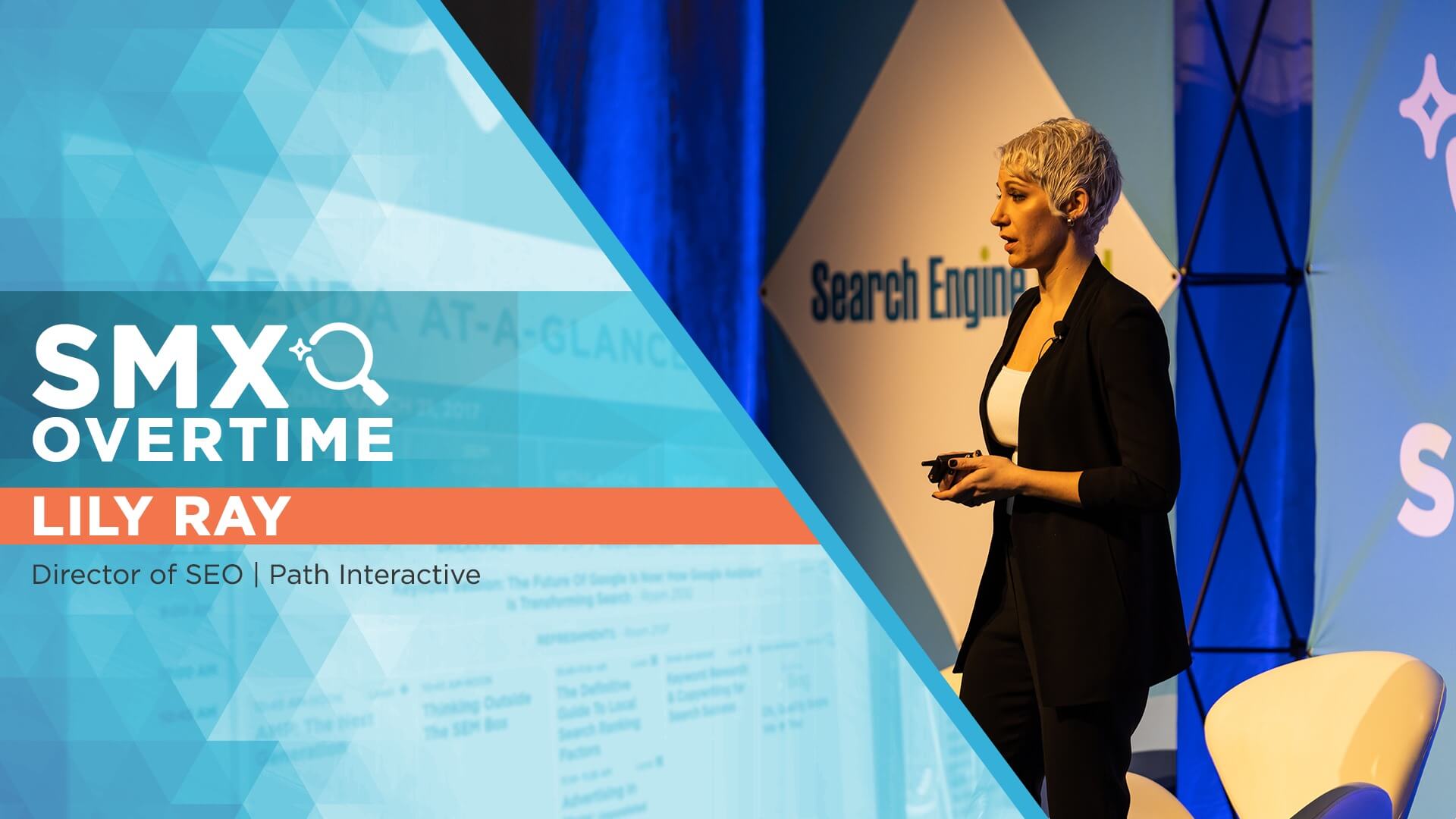
Director of SEO at Path Interactive, Lily Ray, was one of the SMX West speakers for the “Machine vs. Man: What Really Matters For SEO Success” session in San Jose. A lot of questions around credibility, authority and ad transparency were submitted by session attendees, so Lily took the time to answer them for us.
Everyone mentioned that author is important to build trustworthiness. What should we do if we have a small website (15 pages) and our content writers aren’t a well-known author?
Ray: The best thing to do is to try to cultivate your authors’ profiles, even if it means starting from scratch. Start by building author bio pages that give context into who your authors are, and why they can be trusted to write about these topics. Establish links between these author bio pages and any related author websites or social media profiles, especially LinkedIn and Twitter. If the owner of your company has more expertise than your authors on the topics they write about – especially YMYL topics (medical, legal, financial, etc.) – then consider disclosing on the page that the owner reviewed the authors’ content for accuracy.
If you have a very credible author, but their online or social footprint is minimal, will search engines not view them as trustworthy?
Ray: In this kind of situation, I don’t think search engines will view them as “not trustworthy,” but rather I don’t believe you will get the added boost of having your content written by well-known, reputable authors. I think any effort to disclose who your authors are and give some background into who they are is a good thing, even if that author doesn’t have a large online footprint yet. (This is, of course, assuming that the author doesn’t have a pre-existing bad reputation and is considered not trustworthy.
If the best content is identified as best because it provides unique value, does that argue for focusing content efforts on niche topics more than broad topics? So go more for depth than breadth?
Ray: I believe that “depth above breadth” is a good philosophy if your goal is to create content that ranks well organically. Because there is so much competition in the search results, if your content is not one of the top 10 best articles on the topic, it’s not going to earn any organic visibility. Therefore, offering robust, highly thoughtful articles that offer deeper expertise than that of competing pages is a strategy likely to produce better results than spreading your content strategy too thin. Furthermore, given Google’s increased focus on expertise and authoritativeness, focusing on niche topics and providing value on specific topics is more likely to result in your writers being perceived as subject matter experts.
Clearly disclosing how you monetize your site seems to be an overarching theme for success. What’s the best way to do that?
Ray: Transparency is key. For most companies, an “About Us” page as well as clear “Terms and Conditions” should be sufficient to indicate to users what the purpose is of your website and how your company makes money. However, if your site runs ads or collects and sells leads, it’s important to make these facts obvious to the user. Disclose where advertisements are located on the page, and/or consider including a discreet disclaimer that explains what happens when the user clicks on the links that make your company money. This can be written as a blurb toward the bottom of the page, contained in the footer, or mentioned in the Terms and Conditions.
On the slide where we were asked to identify the ads: Does this mean that native ads, even those ran though Google, are on the way out? It’s my understanding that native ads are intentionally designed to blend in.
Ray: I don’t believe native ads are on the way out. Google understands that many sites rely on ad revenue as a means of existence. However, I do think Google is becoming stricter around the quality and placement of native ads. Ads should be distinguishable from the main content of the page, and shouldn’t deceive the user into thinking they’re part of the main website experience. Most reputable ad networks have built-in functionality to indicate which links are ads. It is also important to ensure you can vouch for the subject matter of what is displayed in your ads. They should not offend or shock users, and their content should generally align with the main purpose of your website.
We have products on our website that are discontinued by the manufacturer. We turn off the ability for the customer to buy the product. The customer can still lookup the product online and it generates traffic to our site. Does this cause our rank to go down?
Ray: If the product is permanently discontinued, it’s a good idea to 404 the page to avoid a poor user experience. Leaving the pages active can be classified as “Soft 404s” in Google Search Console because Google doesn’t want to serve pages where the product is not available to searchers looking to purchase that product. However, many SEOs have seen success by keeping these types of pages live, but offering other valuable content on the page, such as purchase history or links to related products – especially if the product will be coming back in stock.
How do the algorithms decide which sites are authorities on trust? For example, does the AI determine that BBB is trustworthy, or is the algo fed that information?
Ray: Despite being asked a similar question many times, Google has declined to describe the exact process the algorithms use to analyze trustworthiness, or which sites it specifically looks at in making these determinations. However, Google does recommend that its quality raters look at the following websites as part of their assessment of reputation information: Yelp, BBB, Amazon, and Google Shopping. Evidence from many sites impacted by recent algorithm updates indicate that perceived trustworthiness across a variety of reputable sources appears to currently be a ranking factor. Several well-optimized websites with great site architecture, great page speed and strong on-page optimizations saw enormous traffic declines for reasons that appear to be tied into external trustworthiness.
After the [Medic] algorithm update on Aug. 1, what are the main areas for an e-commerce health site to update, improve, modify?
Ray: A site that is both health-related and e-commerce could face a double-whammy of E-A-T issues. On the one hand, since you offer health content, it’s crucial that your site presents accurate, unbiased medical information; cites its sources; works with medical professionals to review the content, and is FDA-compliant. Beyond those health-related considerations, it’s also important to follow best practices for e-commerce E-A-T compliance: offering a secure check-out process, good customer service, clear information on returns and exchanges, and good external reviews.
About The Author
Popular Stories
 SMX Overtime: What really matters for SEO success
SMX Overtime: What really matters for SEO success
 Google Can Now Solve Your Geometry Math Questions
Google Can Now Solve Your Geometry Math Questions

 Google Word Coach, a fun word game in the search results
Google Word Coach, a fun word game in the search results